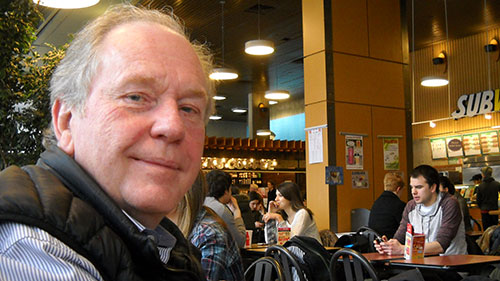
At home in Toronto, he makes a great bobotie — a South African shepherd’s pie with seafood. Here at Guelph, Paul Uys is working to help create a more sustainable food chain as senior director (external) of the U of G Food Institute.
Created in 2012, the institute aims to connect all food-related research and activities at U of G’s seven colleges with the food industry. Acting as a virtual portal for University resources, expertise and networks, it allows information to be shared all the way along the supply chain from farm to fork, says Uys.
He and other researchers hope to improve food production, safety and security, and better understand the impact of food on culture, economies, health and the environment.
Through seminars, networking events and training programs, researchers aim to help strengthen the country’s food sector, and further boost U of G’s reputation as Canada’s “food university.”
Uys starts by turning that “farm to fork” mantra on its head. Try “from fork to farm,” he says.
Looking at our food chain from that direction acknowledges how consumer preferences are increasingly driving practices — including sustainability, animal welfare and water stewardship — from retailer to distributor to manufacturer, and processor to farmer.
Consumers have become more interested in environmental and sustainable issues and are pushing the food sector to adapt by offering new green and ethical products.
“Ten to 15 years ago, we didn’t dream of issues like diminishing biodiversity and water security,” says Uys, who spent four decades in the food business, including serving as an executive with Loblaw Companies Ltd.
Originally from South Africa, he came to Canada in 1987 to head up Loblaw’s then-fledgling product development group. He led the development of the President’s Choice and No Name brands, and as vice-president of innovation, he launched the President’s Choice Organics, PC Blue Menu and PC “Free From” brands. He came out of retirement to join U of G in 2013; the following year he received an honorary doctorate from the University.
Rene Van Acker, associate dean (external relations) with the Ontario Agricultural College, says Uys’s food sector contacts and knowledge made him an ideal choice to lead the Food Institute.
Van Acker says the institute is “a way of connecting the sector to experts and expertise here on campus and through our networks. The end goal is mostly to help the food sector to grow in Canada.”
Among its activities, the institute pulls together researchers and resources to work with food companies and organizations on specific research topics, including social justice and food safety topics.
It has held forums on sugar and food prices. In June, the institute will hold a three-day seminar for food and agriculture industry leaders to discuss case studies on topics that include branding, consumer engagement, labour issues and genetically modified ingredients.
Partnerships through the Food Institute benefit both the University and the industry, says plant agriculture professor Ralph Martin, Loblaw Chair in Sustainable Food Production.
“I think the Food Institute — like Paul — is a bridge between academics and the world of business,” says Martin. “In order to see the whole picture and how it fits together and where there might be synergies and overarching benefits of working together, that’s what the Food Institute is for.”